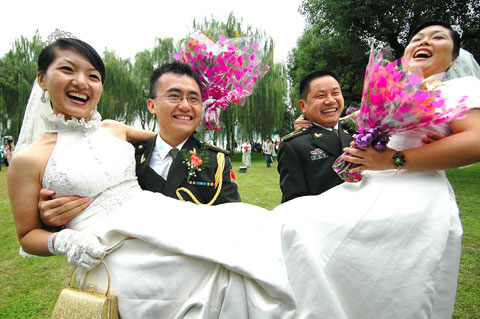The call on China by the international community to assume a "major power responsibility" is getting louder by the day as the country's economic strength grows, and its influence on the world economy increases.
"Major power responsibility" involves many things. As far as economic responsibility is concerned, it includes protecting the existing global economic order and rules, joining efforts to solve the worsening problem of global imbalance and environmental destruction, opening the financial market wider, advancing market reform, improving the social security system, effectively adjusting the means of economic growth, and increasing international aid.
There are both subjective and objective reasons behind the international community's call on China to assume "major power responsibility".
Objectively, the main reason is pervasiveness of the "China factor" all over the world. The Chinese economy has maintained a blistering pace in the past three decades of reform and opening up.
Authoritative international economic analysis agencies predict that China will replace Germany in 2008 as the world's third largest economy. As its economic strength grows markedly, China's influence on the world economy also increases. China's GDP accounted for just 5 percent of the world's total last year, but about one-third of the real growth worldwide came from China. The "shockwave" caused by finished industrial products has been felt even more strongly, so much so it has stirred up rumors "China is exporting deflation" in some corners of the world.
The adjustment of the international political and economic landscape also lends weight to the objective reason. Many international economists believe the global economy is undergoing its greatest transformation since the Industrial Revolution, with the centre of economy shifting from Western Europe and North America to emerging markets in Asia, Eastern Europe, the Middle East and Latin America.
Yet another objective factor is found in the declining capability of Western powers led by the United States to "manage" global economic affairs. The US economy is sinking deeper in its fiscal and current account deficits, which makes it increasingly reliant on the injection of international capital, while its domestic financial and monetary policies are more and more at the mercy of international factors.
The International Monetary Fund (IMF) is losing its influence fast as a result of its obsession with the "Washington Consensus" and the increase of foreign reserves held by developing nations (now accounting for three-fourths of the world's total); the World Trade Organization (WTO), meanwhile, is in an embarrassing limbo because of the suspension of the Doha Round of market access talks and the popularity of regional as well as bilateral free trade; and the "Group of Seven" (G7) finds itself under much criticism for lack of being representative, that it is increasingly difficult for it to globally adjust.
From a subjective point of view, some local governments and government departments are, to a certain extent, responsible for the spreading of the "major power responsibility theory", as some of them, motivated by their own interests, are now pursuing international "image-building projects". The resulting impression is a developing country trying to assume a formidable presence without the necessary muscles.
Also, some State-owned enterprises have got carried away by their domestic monopoly status and jumped on the poorly-coordinated "going overseas" bandwagon simply out of the personal interests of their executives. Their "high-key but low-efficiency" projects have made a lot of discomforting noise around the world, and have contributed little to the country.
It is no child's play for the US-led Western nations to figure out a way to fit emerging powers, and especially China, into the existing world economic system, and they hope to use "major power responsibility" as a leverage to somehow lift their preferred international moral standards back on top.
Shouldering certain international responsibilities as long as our economic capabilities can afford it will not only help refute the "China threat" theories and enhance the country's international image, but also nurture peace, development and cooperation among nations of the world as well as improving our international environment for sustained economic development.
However, "major power responsibility" presents not just opportunities but serious challenges as well.
The first risk that comes to mind is the deteriorating conditions for foreign trade. Though China's economy has made significant progress within the confines of the existing international economic order, the current international economic order and rules, which were mostly formulated by Western powers to reflect their interests, do not work well for the realization of China's long-term and strategic interests.
If China dances to the tune of the West, its trade environment will only deteriorate further. It is an important part of the existing international economic order to maintain the vertical division of labor with developed countries on top. Western powers use their control over technology and intellectual property rights (IPR) to keep China tied to labor- and resource-intensive manufacture at the lower end of the value chain.
Western powers have always kept their leadership in setting IPR rules, such as extending the duration of patent protection contained in the Agreement on Trade-Related IR Protection and patenting various business models, technical methods and service formats that are not patentable according to the traditional concept. When implementing this kind of arbitrary rules, they also abuse IPR by including technologies that are hardly innovative or unique in their patent franchises to gain market monopoly.
It is a sinister trap threatening China's implementation of its self-determination and innovation strategy. If the situation goes on, China will be stuck in a situation where "Western powers take away the kills (profits) while China is left with the numbers (GDP)," a trap that lets China "grow up but not go anywhere".
The next risk comes from Western influences that will prevent China from developing the way it wants or pin it down with a growing load of "responsibilities". As eco-disasters caused by global warming and rising prices of natural resources draw more attention of the international community, China should join the world community in addressing this grave issue. But, it must be noted that developed nations' industrialization and obsession with living comforts have consumed most of the world's resources and piled up a mountain of environmental problems, while the developing countries are only responsible for those added in recent history. It is unjust and unreasonable for developed countries to accuse developing nations such as China of triggering environmental problems and assume that it should take more "major power responsibilities" in this regard.
China and other developing nations have the same undeniable right to development the developed countries enjoyed before they became so. It would be hard for China to pursue normal economic development if it is forced to assume "major power responsibility" on resources and environment issues more than it rightfully should. China has always been a responsible country and is playing an increasingly important role in international affairs. It has been taking more responsibilities in international affairs on its own initiative in recent years.
China has made impressive achievements in economic aggregates, foreign trade, attracting foreign investment and official foreign reserves, but its per capita annual income is still ranked at a lowly 110th place in the world. Today, there are 135 million people living under the international poverty level of $1 a day, accounting for 10.4 percent of the total population and 18 percent of the 750 million throughout the world.
China still has a very long way to go before becoming an economic and financial major power. With this reality in mind, we need to step up coordination of foreign economic operations, stay low-key and cautious. We need to remain a big country that always keeps its promises and is always responsible and trustworthy.
We need to keep in mind that addressing injustice in the existing international economic order is a long and arduous undertaking and China must adapt to and make use of the existing order and rules. Experience tell us China is also a beneficiary of economic globalization and the country will respect the existing international economic order and rules and join efforts in solving the worsening global imbalance.
We should proactively shoulder international responsibilities as our national strength allows and according to our own moral standards as well as the existing norms of international affairs. China has made impressive progress in IPR and environmental protection and increasing its contribution to international aid programs, but is still not quite up to the expectations of the world community. Looking ahead, we should be more proactive in joining efforts that benefit others as well as our own country.
We should also step up dialogue and cooperation with Western powers and especially the US, learn about their views about China and explain to them the concept and path of development we have chosen. When making efforts to increase economic exchanges with African and other developing countries, we should keep such international rules as the Equator Principles and the Action Plan for Extractive Industry Transparency.
China has always been a nation that means what it says and therefore should seriously keep its promises to the international community. However, we must be extra careful about complying with ceaseless demands from Western powers for further opening and reform that will affect our national economic sovereignty and economic security.
The author is a researcher with China Institute of Contemporary International Relations
(China Daily 10/23/2007 page9)











